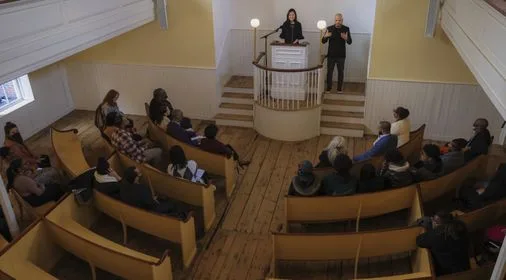
The city of Boston has tapped two teams of researchers to help guide a task force that is studying reparations for descendants of those harmed by slavery, amid a hodgepodge of competing visions for what a reparations program here should look like that has only slowed down the process.
The City Council created the task force on reparations through a city ordinance in late 2022, with a directive to recommend a reparations program by the end of this calendar year. But in the time since, the task force has yet to fully take shape, and an independent community group was subsequently formed to put forward its own proposals.
Segun Idowu, the city’s chief of economic opportunity and inclusion, said in an interview that the new research consultants will help the city streamline the process and study how Black Bostonians have been impacted by slave-trade policies, from 1620 through today.
“There is no roadmap for reparations, but the fact that … there’s a clear path forward is monumental work,” Idowu said. The research will help guide “an open dialogue with the community to better understand people’s sentiments and the direction reparations needs to go.”
The city tapped the research team behind the African American Trail Project at Tufts University and historians at the Royall House and Slave Quarters in Medford to study Boston’s role in the trans-Atlantic slave trade and its overarching influence during the time from 1620 to 1940.
Separately, a cohort of Northeastern University scholars will research slavery’s longstanding legacy through inequality within the Boston Public Schools, Boston Police Department, Boston Fire Department, and Boston Housing Authority in the era after 1940.
The city has set aside $500,000 for the research, using federal COVID-19 relief funds and also city funds, and the work will be used for a detailed report on a reparations program in Boston.
A little-known poll by the Health Equity Compact and MassINC last spring showed that three out of every four Black respondents supported monetary reparations to address racial health disparities and other inequities, and so did two-thirds of Latino respondents. Half of Asian respondents in the poll said they support reparations, while only 40 percent of white respondents did — 44 percent said they opposed reparations.
The work on reparations in Boston follows efforts at the community level as well as in other municipalities and at the State House to explore how Massachusetts can reckon with its past, part of a nationwide movement to recognize and make reparations for the impact of the slave trade. Advocates in other states such as California, New York, and Illinois have been leading the effort, and created commissions in those states through new laws. Officials in Evanston, Ill.have also expanded that city’s first-in-the-nation direct-cash reparations program.
But in Massachusetts, the effort has moved at a far slower pace. Last year, state Senator Liz Miranda of Dorchester filed legislation that would create a Massachusetts reparations study commission. She also proposed creating a reparations fund using a portion of excise taxes imposed on “specified applicable educational institutions.” The Legislature’s joint judiciary committee held a hearing on the legislation in early December, though no action has been taken since.
In Cambridge, the City Council agreed in December by a unanimous vote to create an American Freedmen Commission, whose members would be paid to investigate how racist policies have harmed descendants of American chattel slavery. The commission is the first in the nation to focus specifically on descendants of slavery. However, the city has yet to name any of the commissioners, and no work has begun.
And Harvard University, through its Legacy of Slavery initiative, recently solicited proposals for solutions that would affect people harmed by slavery. But no work has begun.
Meanwhile, 40 community members in Boston, frustrated with the lack of progress by the city’s task force, formed their own, an independent, grass-roots effort to weigh reparations in the city. The commission is organized by the New Democracy Coalition, which has led efforts to rename Faneuil Hall and has pushed the city to issue a formal apology for its role in the trans-Atlantic slave trade.
“As the city of Boston moves forward exploring reparations for those affected by lack of opportunity and systemic racism, all voices need to be heard,” the group wrote in a press release.
The city’s task force has encountered several disruptions since it was first formed. Two of its original 10 members have stepped down, citing time constraints, and the vacancies have gone unfilled. (One of the members to step down is Kerri Greenidge, one of the Tufts scholars selected to study slavery’s legacy in Boston from 1620 to 1940.)
Moreover, a part-time project coordinator for the task force was fired in May, after trespassing into City Hall offices after hours several times and resisting arrest.
David Harris, a former task force member and former managing director of the Charles Hamilton Houston Institute for Race and Justice at Harvard Law School, said the task force’s earliest moments were tedious, with many logistical issues to work out and limited consensus on how repair would be defined. But he insists the work was necessary.
“It’s taken a year to get where we are today. … There were growing pains,” he said. “The city’s process might be cumbersome to some, but it’s sound.”
Harris said the research consultants can help “yield a piece in the puzzle for conversations about reparations in Boston.”
But, Harris added, “The hard work will be around what reparations could look like.”
The task force sought proposals from consultants on how to shape the research; the request for proposals specifically asked applicants to study wrongs committed against African Americans over six time periods, from 1620 to today. At least five consultants submitted proposals, according to a Globe review.
The proposals reflect the varying definitions of reparations, and who exactly could qualify, a topic that became a central and divisive question in the five public meetings the task force held since last spring. At times, the meetings were tense, with attendees debating who exactly should receive compensation for past wrongs.
An attendee at one meeting decried the racist policies that all Black Bostonians, whether they descended from American chattel slavery or not, had borne for generations. Another told the crowd that Black people who came to the United States on their own from Caribbean islands should seek to settle their claims with their home countries.
The divides among community members show the challenges that the task force will face in identifying who will qualify for any reparations. But Harris, the former task force member, said that however Boston proceeds, the city must incorporate all community perspectives.
”Whatever happens, it’s going to be in the name of the city as a whole,” Harris said.
Tiana Woodard is a Report for America corps member covering Black neighborhoods. She can be reached at tiana.woodard@globe.com. Follow her @tianarochon.


